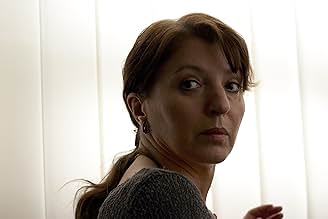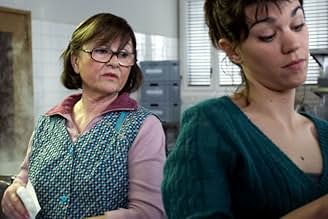Agrega una trama en tu idiomaRuza left Belgrade for Switzerland as a young woman full of hope for a new, better life. 25 years later she appears to have achieved everything: She owns a canteen in Zurich, which she manag... Leer todoRuza left Belgrade for Switzerland as a young woman full of hope for a new, better life. 25 years later she appears to have achieved everything: She owns a canteen in Zurich, which she manages with a firm grip and financial success. Ruza values her meticulously-structured daily r... Leer todoRuza left Belgrade for Switzerland as a young woman full of hope for a new, better life. 25 years later she appears to have achieved everything: She owns a canteen in Zurich, which she manages with a firm grip and financial success. Ruza values her meticulously-structured daily routine, both in her professional and private life. Ruzas's orderly world shifts when 22-ye... Leer todo
- Dirección
- Guionistas
- Elenco
- Premios
- 9 premios ganados y 2 nominaciones en total
Opiniones destacadas
Social topics have a long tradition in Swiss film. I just remember Kurt Früh's "Bäckerei Zürrer" where the conflicts between the early Italian immigrants and the indigenous population in Zürich are focused, or later especially in the movies of Kurt Gloor (1942-1998), f.ex. "Die Plötzliche Einsamkeit Des Konrad Steiner". Not to forget the movies of Alain Tanner, although his movies are all in French and thus form a minority in the rest of Switzerland. Also the present movie deals with immigrants, has a strong social vein, but unlike Früh's and Gloor's movie, you hardly hear Swiss German spoken. The three main actresses - famous artists imported from Ex-Yugoslawia as if there would not be enough talented Yugoslawian women familiar with the jobs shown in the movie - speak broken High German. From the rest of the cast only the two men - Andrea Zogg and the Spaniard Pablo Aguilar - are to be mentioned: Zogg is to see about four or five times for possibly 10 minutes, Aguilar for totally perhaps 2 minutes, and the rest of the crew for fragments of seconds. So, an interaction between the Yugoslawian immigrants and the Swiss population is out of the question and the movie is showing nothing else than how the three women get along, partly speaking Serbian/Croatian and partly broken German. In this movie, there is no trace of the wit, the humor, the tears-causing miseries and the whole empathy of Kurt Früh's movies, but nothing either of the socialist problems brought up in Kurt Gloor's films. This movie was produced in Switzerland, that is all. It could play anywhere in Europe, there is nothing Swiss-specific in this movie, except perhaps the five seconds when your hear Zurich's "Radio 24".
Let me tell you one thing: As long as Kurt Früh's and Kurt Gloor's movies are not subtitled, engraved in international DVDs and available around the world, such mediocre and questionable films like "Das Fräulein" have no right to go around the world.
The details of the movie are done well, the colours, the sounds, the camera angles. With strong details but weak theme, this movie ends up feeling myopic, a feeling only underscored by the many close-up shots and the rarity of wide-angle, panoramic shots. There's a distinct lack of context - this story about immigrants, young and old, could take place anywhere. I didn't even know this was a Swiss film until I started reading other reviews.
Some movies feel intimate when they concentrate on the immediate details, as this movie does. However, the emotional remoteness of all the characters prevents any intimacy from developing, and instead all that's left is myopia.
A remarkable, small, deeply felt, just slightly offbeat film about what must have been a common and terribly real and depressing reality. Several women from the former Yugoslavia are living in German speaking Switzerland, and the old ties, old animosities, and new ties and friendships, are poignant and delicately worked out.
Sometimes low budget films revel in their lack of polish, as if announcing they are rebellious. "Fraulein" is really not at all an underground film, but rather just a serious one working within some limitations of money and time. And they make the most of it on every level. Above all, the main actresses--the older woman running the little restaurant and the young woman with some undisclosed inner trauma--are searingly right on. The one is repressed and responsible and a bit lifeless, living to survive, and proud to be surviving. The other is a little wild and unpredictable, full of life but with a recklessness that seems unwarranted. At first.
Both women are sad and lonely, and that leads to their needing each other, though both are so stubbornly independent they have trouble coming together as friends. When they do, in small ways, the screen lights up and you keep thinking, yes, yes, at last. You understand how hard it is to find true companionship, and even when you do, it doesn't work out quite right. Still, they both offer cracks in each other's worlds, and we get sucked in for the joy of it, and the eventual disappointment.
A surprising film, very moving, and yet quietly so. Give it a chance to get under your skin. At first, watching just the older woman, you think this is some East Berlin throwback and it's just sad and slow. But it's all for a good end, and things complicate. And the two women, once you get to know them, will win you over.
¿Sabías que…?
- TriviaMirjana Karanovic, Marija Skaricic, and Ljubica Jovic don't speak German or Swiss-German. Although the script had all the German texts translated, they had to learn their lines by heart and act without having a true feeling for the language.
- Bandas sonorasGypsy Kolo (Ma Maren Ma)
Written by Ran du Bandurovici
Performed by Jony Iliev & Band featuring Martin Lubenov
(C) Asphalt Tango Records GmbH, Berlin
Selecciones populares
- How long is Fraulein?Con tecnología de Alexa
Detalles
- Fecha de lanzamiento
- Países de origen
- Idiomas
- También se conoce como
- Fraulein
- Locaciones de filmación
- Productoras
- Ver más créditos de la compañía en IMDbPro
Taquilla
- Total en EE. UU. y Canadá
- USD 5,715
- Fin de semana de estreno en EE. UU. y Canadá
- USD 2,449
- 21 sep 2008
- Total a nivel mundial
- USD 5,715
Contribuir a esta página
























